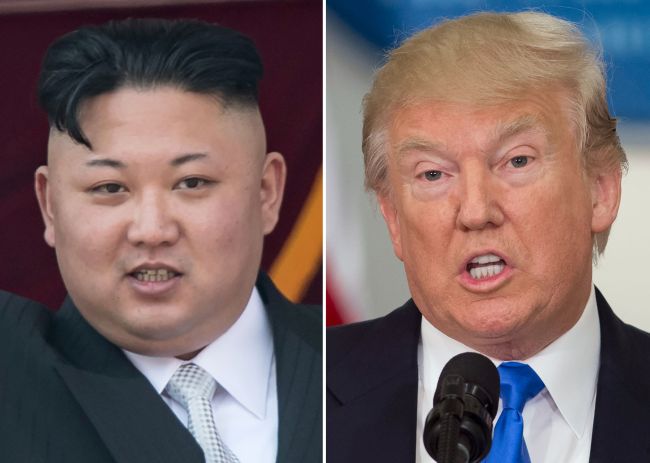In many ways the two leaders on either side of North Korea-United States missile stand-off could not be more different. In others they are startlingly similar.
North Korea’s Kim Jong-un has just overseen his second test of an intercontinental ballistic missile, bringing much of the US mainland within reach and presenting US President Donald Trump with a crisis.
But while Pyongyang has long issued bellicose threats of nuclear war, this time it is the leader of the United States of America who is declaring that his weapons are “locked and loaded” and promising “fire and fury like the world has never seen.”
 |
North Korean leader Kim Jong-un (left) and US President Donald Trump AFP-Yonhap |
“Donald Trump is probably the unlikeliest president of the United States you could possibly imagine, whereas Kim Jong-un was the chosen heir,” says John Delury, an associate professor at Yonsei University in Seoul.
Kim’s father and predecessor Kim Jong-il had groomed his son to take his place at the top of Pyongyang’s political pyramid for years before his death in 2011.
For his part Trump reached the White House via a career in property development and reality television, followed by an unprecedentedly populist election campaign that upended the US political establishment.
While Kim was a youthful ingenue when he came to power -- and remains among the world’s youngest leaders -- he has now held office for several years, while Trump, a grandfather in his 70s, is in his first political post.
“It’s a weird situation where he is much more experienced than Donald Trump, who is twice as old as him,” says Delury.
Kim “probably thinks he’s going to be around after Trump is gone,” he points out. “Because he’s the heir of what appears to be a pretty stable, dynastic state means he has a longer time horizon than most people.”
And with a universally loyal media in the Democratic People’s Republic of Korea, as the North is officially known, and no social media, Kim has no need to concern himself about tomorrow’s headlines -- or respond to them on Twitter.
Both men “prize loyalty,” says Delury, and are willing to employ “a high level of flux in personnel to ensure that it’s their people who are running the system. That’s a commonality between Kim and Trump.”
They also both deploy relatives in government. Dynastic descent from the North’s founder Kim Il-sung is the basis of Kim’s personal legitimacy -- Pyongyang’s propaganda promotes the similarities between them in looks, mannerisms and even handwriting -- and several members of the Kim family hold influential positions.
In Washington, Trump’s daughter Ivanka is an assistant to the president, her husband Jared Kushner is a close adviser, and Trump’s son Donald Jr has been embroiled in the investigation into alleged Russian influence in last year’s election.
Family politics are “formalized in the North Korean system but it’s been introduced through the Trump family in a way that’s unnerving to some Americans,” says Delury. “There’s another analogy there.”
Now the two sides are locked in a cycle of threat and counter-threat, with Pyongyang revealing a plan to send a salvo of missiles toward the US Pacific territory of Guam.
North Korea has been issuing hyperbolic threats for decades, such as turning Seoul into a “sea of fire” -- one recent academic analysis of its language was titled “Turning it up to Eleven.”
Pyongyang sees itself as defiantly facing down the menace from Washington, and anything fitting into that narrative bolsters the regime’s claim to legitimacy.
At the same time Trump has theatrical instincts.
“This is the WWF part of Trump, reality TV, where each day is like a mini-show, and you need a foil, you need an enemy, you need a sense of drama and a good guy and bad guy, all these classic elements of popular entertainment,” says Delury.
“While North Korea is a horrifically stupid choice as a place to fight a real war, it’s a great place to fight a fake war. They will do this for four years, happily, keeping it at rhetorical Defcon 10.
“It looks to me like they both really want this,” he added. “I think they are thriving on it.” (AFP)








![[Today’s K-pop] Blackpink’s Jennie, Lisa invited to Coachella as solo acts](http://res.heraldm.com/phpwas/restmb_idxmake.php?idx=644&simg=/content/image/2024/11/21/20241121050099_0.jpg)